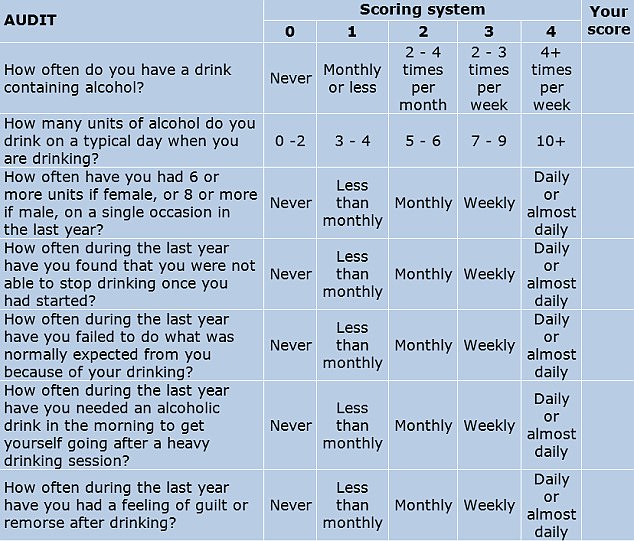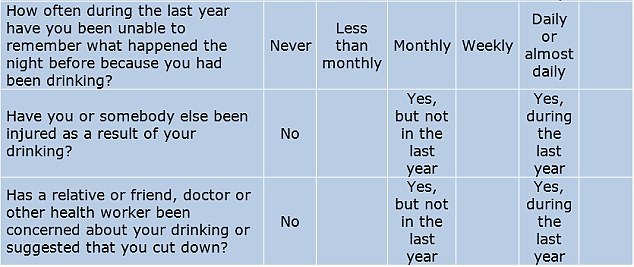Research dispute claims that light alcohol consumption can protect against diabetes and obesity
A glass of wine every night is not good for your health, scientists warned today.
Researchers argue that even light consumption — defined as one drink a day — can make people fatter.
This, in turn, could lead to type 2 diabetes, the Canadian experts claimed.
The study, which involves data from more than 400,000 Britons, adds to the decades-long argument over the harms of moderate drinking.
Some research has suggested that a daily drink can prevent numerous diseases. However, others have argued that even light drinking is dangerous.
The study, by academics at McGill University in Quebec, was observational. All participants, from the British biobank, were asked to self-report their BMI and alcohol intake. Scientists found one extra glass per week, saw an average increase of 0.36 kg in fat mass, a 1.08 higher risk of obesity and 1.1 higher risk of developing type 2 diabetes
But critics have pointed to flaws in the latest research, published in the Journal of Clinical Endocrinology and Metabolism.
The study, by academics at McGill University in Quebec, was observational.
All participants, from the British biobank, were asked to self-report their BMI and alcohol intake.
It meant researchers could see that the biggest drinkers, who consumed 14 drinks per week, weighed more than other groups.
Scientists found that for every extra drink per week, people had 0.36 kg more fat and a 10 percent chance of developing type 2 diabetes.
These associations were stronger in women than in men, researchers said.
But the study, by design, failed to disentangle the effects of alcohol and other factors that could influence weight, critics said.
Christopher Snowdon, head of lifestyle economics at the Institute of Economic Affairs think tank, told MailOnline: “The finding that heavy drinkers tend to be fatter than teetotalers is not very surprising.
‘We don’t talk about beer bellies for nothing.
“But the methodology of this study is too crude to tell us anything we don’t already know about the benefits of moderate drinking.”
He added that the technique used for the study, called mendelian randomization, “is a useful tool for some scientific endeavors but has so far proved virtually useless when it comes to lifestyle epidemiology.”
Study author Dr. Tianyuan Lu said: ‘Some studies have shown that moderate drinkers are less likely to develop obesity or diabetes compared to non-drinkers and heavy drinkers.
‘However, our research shows that even light to moderate alcohol consumption does not protect against obesity and type 2 diabetes in the general population.
“We hope our research helps people understand the risks of drinking alcohol and informs future public health guidelines and recommendations regarding alcohol consumption.
“We want our work to encourage the general population to choose alternative healthier behaviors over drinking.”

Data from a 2022 Organization for Economic Co-operation and Development (OECD) report found that Britons drank 9.7 liters of pure alcohol per adult in 2020 – 0.1 less than the EU average.
It comes after World Health Organization (WHO) officials in January warned that no amount of alcohol is safe.
The WHO estimates that excessive alcohol consumption kills 3 million people worldwide every year.
But earlier this month, US scientists discovered that regular low levels of alcohol lead to long-term reductions in stress signaling in the brain, which are linked to heart attack and stroke.
Using brain scans from more than 700 people, when the researchers looked at the history of cardiovascular events of these individuals, they found fewer heart attacks and strokes among light to moderate drinkers.
While alcohol has long been known to reduce the amygdala’s response to threatening stimuli while drinking, this is the first to point to longer-term neurobiological effects.
The amygdala is the area of the brain primarily associated with emotional processes.
Britons are urged not to drink more than 14 glasses a week on a regular basis – the equivalent of six pints of lager or ten small glasses of wine.
The NHS also advises spreading drinking over three or more days to avoid binge eating.
Meanwhile, the US says women can have no more than seven standard drinks per week and men can have 14.
These measures include a medium glass of wine and 340 ml of beer, close to a normal bottle size.
Excessive alcohol consumption can permanently damage the liver and cause a variety of cancers and increase blood pressure.


